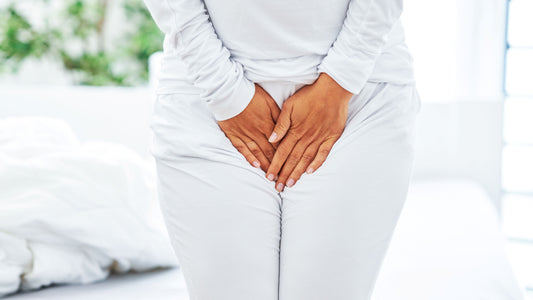As your body and your libido change during and after menopause, it often sends your relationship into uncharted territory — and figuring things out as you go along can get…complicated. Which is why I’ve compiled my best sex after menopause tips for you all in one place.
Let’s talk about:
How to manage physical changes and boost female arousal after menopause
The emotional and health benefits of sex after menopause
Tips for discussing sex openly with your partner post-menopause
Let’s start by clearing up one of the biggest misconceptions about this topic.


One of the most common questions people ask is, “Can a woman have sex after menopause?” The answer is a loud and resounding yes.
Menopause marks the end of your reproductive years, not the end of your sexuality. While hormonal changes can affect things like vaginal dryness, arousal, or libido, they don’t eliminate your capacity for pleasure, intimacy, or sexual connection. In fact, many women report that sex after menopause feels more emotionally satisfying, with less pressure and more freedom to explore.
It’s also completely normal if your sex life looks different than it was in your 30s or 40s. The key is embracing those changes without judgment. Whether that means taking a little more time to warm up, using a good lubricant, or experimenting with new ways to connect — there are many ways to make sex fulfilling at this stage of life.
The most important thing? Knowing that your body is still worthy of pleasure and your desire still matters.
The Physical and Emotional Benefits of Sex After Menopause
Sex after menopause isn’t just about staying connected — it can actually boost your health and happiness in meaningful ways.
Physically, sexual activity may support circulation and help keep tissues flexible when practiced regularly. In fact, your vaginal, vulvar, and clitoral tissues are more likely to atrophy the less you use them. It’s very much considered a “use it or lose it” situation down there.
Sexual activity can also support better sleep and immune function, plus release endorphins that naturally elevate your mood. These benefits of sex after menopause aren’t just about the act itself, but about staying in tune with your body and maintaining a sense of joy in your life, too.
Emotionally, sex can be a powerful tool for reducing stress, enhancing intimacy with a partner, and reclaiming a sense of confidence and desirability.
Whether solo or shared, sexual expression at this stage of life can be a grounding, life-affirming experience that nourishes both body and mind — you don’t need to give up on sex just yet!
But how do you get there when your vagina feels dry, you’re tired all the time, and your libido has packed up and moved far, far away? Let’s talk about it.
Understanding Female Arousal After Menopause
If arousal feels different than it used to, you’re not alone — and you're not broken.
And that’s because, during peri/menopause, estrogen levels drop, which can lead to reduced blood flow to the genitals, vaginal dryness, and a longer arousal time. These changes can make it harder to feel “in the mood” quickly, but that doesn’t mean your desire is gone — it may just need more time, stimulation, or intention to awaken.
Understanding female arousal after menopause means accepting that it may be less spontaneous — and that’s OK. You might not feel desire before intimacy starts — but once you’re relaxed, supported, and engaged, your body can absolutely follow.
Maybe physical touch, sensual massage, or even scheduling time for intimacy helps reawaken your desire.
And don’t underestimate the power of mental stimulation — fantasy, memory, and emotional closeness all play a big role in sexual readiness.
>> The key is to get curious, not critical of yourself, and figure out what turns you on now.
How to Increase Sex Drive During Menopause
While a shifting sex drive during menopause is completely normal — it doesn’t mean you have to settle for a sexless relationship.
Hormonal changes, particularly the drop in estrogen and testosterone, can lead to a decreased libido. But lifestyle habits, emotional well-being, and relationship dynamics also play a huge role in how much desire you feel. The good news? There are many ways to naturally support and increase sex drive during menopause.
Here’s the thing. No matter what, you have to build a solid foundation, starting with the basics: eat a nutrient-dense diet, prioritize sleep, reduce stress, and stay physically active.
Exercise increases blood flow and boosts feel-good hormones like dopamine and serotonin, both of which are key players in sexual desire. Mind-body practices like yoga and mindfulness can also help reconnect you to your body in a pleasurable, nonjudgmental way.
Nutrition counts, too — eating a balanced diet rich in healthy fats and antioxidants can help support hormonal balance.
And don’t forget: trying new things and giving yourself permission to explore desire without pressure can help to reignite your spark, too.
One of my favorite tools for this is a high-quality lube like Velvè. Having a clean lubricant on hand for when those intimate moments crop up is essential. It helps give you the confidence to explore and makes spontaneity possible.
Shop Velvè here.
Vaginal dryness is one of the most common changes women experience during and after menopause.
As estrogen levels drop, the vaginal lining becomes thinner and less lubricated, which can make sex feel uncomfortable or even downright painful. But the right lubricant can make a huge difference, turning discomfort into pleasure and helping you feel confident and relaxed during intimacy.
When it comes to choosing the best lubricant for sex after menopause, here are a few things to consider.
You want a clean lube.
Your lady parts are very vascular, which means they absorb what you put on them quite quickly into your bloodstream.
So ingredients like propylene glycol (which is used in antifreeze and is a known skin irritant) probably aren’t a great choice for your lube formula.
And things like petrolatum and nonoxynol 9 can disrupt your vaginal microbiome, especially if you’re sensitive. Cue the infections and even more dryness down there. No thanks.
Plus, some oil-based lubricants (like coconut oil) are natural, but not safe to use with latex condoms. And talk about messy!
Yes, you can get a superior, natural-feeling, long-lasting slippery experience without silicone. Which is great news if you don’t want to stain your sheets and want to be able to clean off easily after sex.
I kept all of this in mind when I created my new personal lubricant, Velvè.
It’s formulated without any questionable ingredients.
And it’s filled with clean ingredients that show your delicate skin serious love.
I’ve even added in some fun touches (like ginseng + guarana seed extract) to help get things flowing down there and skyrocket vitality! Vavavoom!
I know you’re going to absolutely love this lube.
Click here to learn more about Velve´!
Using lube isn’t about failure. It’s about finding what feels best for your body. It’s about comfort, pleasure, and rediscovering what works for you now — not what used to work before.
What to Know About Unprotected Sex After Menopause
It’s a common assumption that once menopause hits, unprotected sex is no longer a concern — but that’s not entirely true.
While it’s true you can’t get pregnant once you’ve gone 12 months without a period (the official definition of menopause), you can still get sexually transmitted infections (STIs). In fact, rates of STIs among older adults have been steadily rising, partly because many believe protection is no longer necessary.
If you’re in a monogamous, STI-tested relationship, you and your partner may choose to forgo condoms — but it’s important to have a clear, honest conversation first. If you’re dating or have multiple partners, using protection is still the best way to stay safe.
Also, keep in mind that hormonal changes after menopause can make the vaginal tissues thinner and more fragile, increasing the risk of small tears and infections. Using a condom with a quality lubricant not only helps prevent STIs but also protects sensitive tissue and improves comfort.
So yes — you can have unprotected sex after menopause, but only if it’s truly safe to do so.
How to Talk to Your Partner About Sex After Menopause
Open, honest communication can be one of the most powerful tools for maintaining intimacy after menopause — but it's also one of the hardest for many couples.
If sex feels different, your desire has changed, or you're experiencing physical discomfort, your partner may not know unless you tell them. That doesn’t mean the conversation has to be clinical or heavy. In fact, approaching it with vulnerability and curiosity can bring you closer.
Here are a few tips for starting the conversation:
Choose the right moment. Avoid initiating a deep conversation in the middle of sex or during a conflict. Find a calm, private time when you both feel connected.
Use “I” statements. Share your experience without placing blame. For example: “I’ve noticed it takes me longer to feel aroused now, and I’d love to explore what feels good together.”
Be specific and supportive. If something hurts or doesn’t feel right, say so — and also let your partner know what does work.
Invite them into the process. Let your partner know you’re figuring this out too and want their support and involvement.
The goal isn’t to solve everything in one talk — it’s to open the door to ongoing, shame-free conversations about pleasure, needs, and connection.
When To See A Doctor Or Therapist
Sometimes, no matter how much you try on your own, sex after menopause still feels confusing, painful, or emotionally distant. That’s when it’s time to reach out for support — and there’s absolutely no shame in doing so.
A gynecologist or menopause specialist can help rule out underlying issues. They can also recommend treatments tailored to your specific struggles. Learn how to find a menopause specialist near you here.
And remember, if sex is consistently painful, don’t ignore it — pain is a signal, not something to “push through.”
If the challenges feel more emotional or relational, a sex therapist or couples counselor trained in midlife issues can help you and your partner navigate changing desires, communication barriers, and intimacy blocks. Sometimes just having a compassionate professional in the room is enough to unlock years of silence or stress.
Getting help is a sign of strength, not weakness — and it's one of the most loving things you can do for yourself.
My Best Sex After Menopause Tips
Sex after menopause isn’t about going back to how things used to be — it’s about discovering what feels good now, on your terms.
Navigating intimacy after menopause can feel like uncharted territory, but it’s also an opportunity for deeper connection, self-acceptance, and pleasure. Your body has changed — but your right to joy, closeness, and sensuality hasn’t gone anywhere, Girlfriend.










